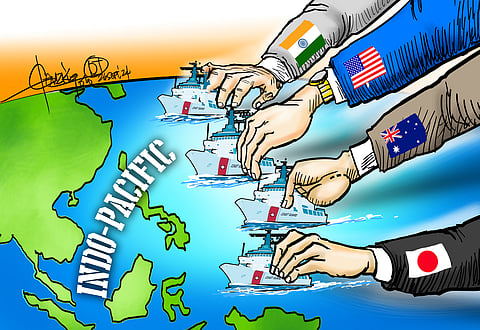
- NEWS
- the EDIT
- COMMENTARY
- BUSINESS
- LIFE
- SHOW
- ACTION
- GLOBAL GOALS
- SNAPS
- DYARYO TIRADA
- MORE

In a significant development for regional security and economic stability, the QUAD countries — the United States, Japan, Australia and India — have agreed to initiate joint coast guard patrols in the Indo-Pacific waters starting next year.
Officially, these patrols are aimed at “monitoring vessels fishing illegally,” but there is a broader geopolitical dimension to this initiative. The QUAD leaders have also condemned “coercive and intimidating maneuvers in the South China Sea” in a joint statement, a veiled criticism of China’s aggressive actions in the region.
This new collaborative effort signals a strategic shift in how these four nations plan to confront emerging security challenges in one of the world’s most contested maritime spaces.
As tensions continue to rise, particularly with China’s expansionist policies in the South China Sea, the QUAD’s announcement reflects a growing commitment to maintain stability, ensure freedom of navigation, and curb illegal activities in the Indo-Pacific waters.
The Indo-Pacific is an economically vital region, home to some of the world’s busiest shipping lanes and rich marine resources. It is also a zone of increasing geopolitical contestation, particularly because of overlapping territorial claims and China’s assertive actions, such as the construction of artificial islands and military outposts in the South China Sea.
These activities have raised concerns not only among China’s neighbors but also among nations with strategic interests in keeping the region open and secure.
For instance, the United States, as a Pacific power, has consistently emphasized the need for freedom of navigation and overflight in accordance with international law.
Meanwhile, Japan and Australia, both heavily dependent on maritime trade, view the Indo-Pacific as crucial to their economic security. India, sharing a long maritime boundary with China, also sees the region as pivotal to its own strategic interests, particularly in countering China’s growing influence in the Indian Ocean.
By agreeing to joint coast guard patrols, the QUAD countries are not only addressing the immediate concern of illegal fishing but are also sending a strong signal about their commitment to uphold international maritime rules and norms.
While the QUAD’s official stance focuses on illegal, unreported, and unregulated (IUU) fishing, the underlying concern is clear: China’s use of fishing fleets as a tool for asserting maritime dominance.
Chinese fishing vessels, often backed by maritime militias and coast guard ships, have been accused of encroaching on the exclusive economic zones (EEZs) of neighboring countries in the South China Sea. These incursions are not only a threat to local economies but also a violation of international maritime law, particularly the United Nations Convention on the Law of the Sea (UNCLOS).
In this context, the joint coast guard patrols take on a strategic dimension. They represent a concerted effort by the QUAD countries to deter China’s gray-zone tactics — actions that are aggressive but fall short of outright military confrontation.
The QUAD leaders’ condemnation of “coercive and intimidating maneuvers” in the South China Sea is a clear reference to China’s activities in the region. Over the past decade, Beijing has aggressively pursued its territorial claims, constructing artificial islands, militarizing them, and engaging in confrontations with other claimants, such as Vietnam and the Philippines.
China’s expansive claims, encapsulated by its “nine-dash line” map, have been widely criticized and were invalidated by a 2016 ruling of the Permanent Court of Arbitration in The Hague. However, China has rejected the ruling and continues to assert control over the area.
By refraining from directly naming China in their joint statement, the QUAD leaders have adopted a diplomatic approach, seeking to avoid further antagonizing Beijing while highlighting its actions’ problematic nature. This tactic is consistent with broader efforts to balance confrontation with engagement, as the QUAD countries remain economically intertwined with China.
The condemnation of coercive actions in the South China Sea underscores the group’s commitment to upholding international law and protecting the rights of smaller nations in the face of intimidation.
